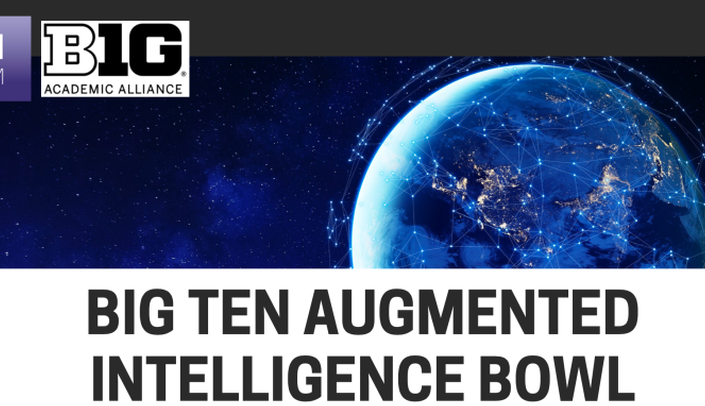The Institute for Augmented Intelligence in Medicine (I.AIM) at Northwestern University hosted the First Annual Big Ten Augmented Intelligence Bowl to address health disparities.
The goal was to bring together talent in medicine and computer science to raise the profile of augmented intelligence (AI) across the 14 institutions representing the Big Ten Academic Alliance.
The University of Nebraska multi-disciplinary team was composed of students from UNMC and UNL. Students came together to address health disparity in hypertension diagnosis and management in African Americans.
The Big Ten Augmented Intelligence competition was a two-part event. In April 2021, the teams from each Big Ten school convened to evaluate their proposals on a set of criteria, including quality, feasibility, scalability, and presentation.
The University of Nebraska participation to the Big Ten Augmented Intelligence Bowl created a collaborative and supportive learning environment for participating students. Teams were exposed to industry and academic leaders during semi-finals educational Zoom sessions.
The University of Nebraska team made to the semi-finals and was composed of:
John Windle, Faculty Advisor, is the Director of the Center for Intelligent Health Care at the University of Nebraska Medical Center. He is a Professor of Internal Medicine and a Holland Distinguished Chair in Cardiovascular Sciences.
Quinn Nelson is a medical student at the University of Nebraska Medical Center. He received a master’s degree in Translational Biomedical Research and undergraduate degrees in IT Innovation and Bioinformatics. His thesis research focused on big data applied physiology using the Medical Information Mart for Intensive Care database.
Mrinal Rawool is a PhD student at the University of Nebraska-Lincoln. She is interested in AI research, specifically, natural language processing, deep learning, Bayesian networks, and explainable AI.
Garrett Wirka is a PhD student at the University of Nebraska-Lincoln. He is interested in machine learning applications and implementation barriers, including model explainability and interpretability, causality, and knowledge modeling.
Thomas Windle is a Clinical Applications Programmer Analyst at the University of Nebraska Medical Center. He works at the Center for Intelligent Health Care and is well-versed in clinical informatics. He spent several years working on the classification of cardiovascular drugs based on the standardized nomenclature for clinical drugs (RxNorm) from the US Pharmacopeial Convention.
Ketemwabi Yves Shamavu is a PhD candidate at the University of Nebraska Medical Center. He is working toward a degree in biomedical informatics, with a specialization in AI and computer science. He is interested in clinical informatics, Bayesian networks, explainable AI, deep learning, and natural language processing. He was a Fulbright Scholar from 2015 to 2018.
